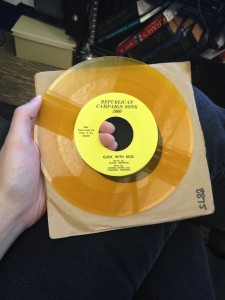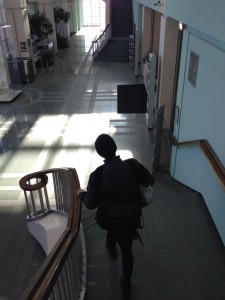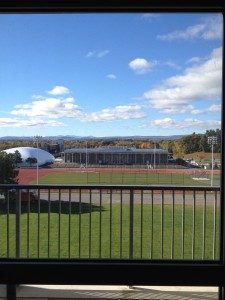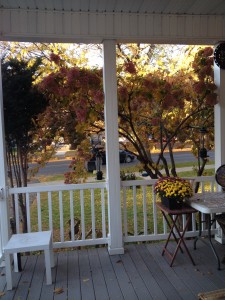Hi everyone! Thank you for “tuning in” to NDSR-NY’s fourth blog post. First of all, I would like to wish you a Happy World Day for Audiovisual Heritage! Today also marks the launch of the American Archive of Public Broadcasting’s online reading room, making thousands of hours of digitized broadcast content available for free in streaming media format.

A perk of working in an audio archive are seeing gems like this (from the Head Archivist Andy Lanset’s collection of election campaign 45s).
I am this year’s resident at New York Public Radio (NYPR), home to stations WNYC FM/AM, WQXR, New Jersey Public Radio as well as the live venue The Greene Space. My project is to lay out a Preservation Roadmap for NYPR’s digital assets. This plan will offer a series of recommendations to simplify and automate archival workflows. This, in turn should make content accessible in a way that will make lives easier for archivists and the staff they serve throughout the various stations.
Addressing broadcast media has become a major issue throughout the library and archives community. Radio was specifically addressed in the Library of Congress’ 2012 National Recording Preservation Plan, stating:
Radio programs make up a significant portion of the nation’s recorded cultural history […] yet there have been few systematic efforts to collect, […] document and preserve the entire range of extant broadcasts in private and public collections.
One of the greatest challenges posed by a current event-and culture-driven archive is that the born-digital output is practically non-stop. In turn, the expectation of the archive is to stay on top of this flow in addition to their pre-existing responsibilities towards housing and digitizing a vast collection of analog legacy media.
Needless to stay, in starting my residency I knew I had my work cut out for me, and started to feel a bit overwhelmed. In response to this, I began to look for workshops that could address these feelings in a constructive way.
I Got the POWRR

Fellow NDSR Morgan McKeehan descending the stairwell of the SUNY Science Library, on our way to the POWRR workshop.
METRO, the professional library organization administering NDSR-NY, suggested that I sign up for the Preserving Digital Objects with Restricted Resources or POWRR workshop in Albany at the Science Library at SUNY. In POWRR’s “About” page, they specifically state that the workshop was established to help those professionals who “felt overwhelmed by the scope of the problem”. This really spoke to me, so I signed up, and off I went along with fellow residents Carmel Curtis and Morgan McKeehan.
POWRR’s approach towards digital preservation is to treat it as a resource issue, meaning most archives large and small lack sufficient staff and funding to enact long-term digital preservation plans. The workshop instructors encouraged us to adapt a certain attitude towards digital preservation: that it does not have to be perfect but can be “good enough” given what you have to work with… and that is okay!

View out the window of the conference room. Take a deep breath, relax, and practice some data accessioning.
This attitude takes a positive spin on the somewhat intimidating world of digital preservation in archives. A common misconception is that somehow an archive can magically emerge TRAC-certified and OAIS-compliant the moment they decide to digitize holdings or improve existing digitization workflows. Expecting perfection may actually be putting content more at risk, since it sets unrealistic expectations that can delay immediate efforts. Instead, we should see the value in taking small yet meaningful steps to address some problems, such as building up our skill sets and connecting with/building a team of committed stakeholders. This should help us sleep better at night.
Near the end of the workshop, the instructor had us brainstorm various possible scenarios that could happen if digital preservation plans are not adopted readily by our organizations that could be used in a digital preservation pitch. The list was vast. Some examples of scenarios offered by the group were as follows:
- A natural disaster will destroy our servers: we will lose everything
- The backlog of items to be digitized will become an avalanche
- The amount of money to alleviate a catastrophic data loss will exceed that of maintaining the data
On the ride back home, I came up with another bullet point to add that could be applied to any archive that supports the production of public programming. Institutional commitment to a long-term digital preservation plan is essential to a radio station’s creative output. The ability for a producer to search, discover and access the breadth of their station’s history fosters innovation in news and storytelling. NYPR can only stand to improve growing their listenership by supporting robust digital preservation systems. My final report will help to point out realistic steps to support NYPR’s mission to nurture creative talent to bring the best of public radio to its listeners.
I would highly encourage readers to attend an upcoming POWRR workshop near them. Not only do they inspire realistic attitudes, they also provide hands-on training in free unlicensed microservice tools (in this case, we practiced using Data Accessioner). Workshop spots fill up quickly; however, I was able to get a spot after being on the wait list, and it was totally worth it!
It is a really exciting time to be working in a radio archive. I will leave you with a few links regarding some media archive-specific events coming up, and a blog post by a previous NDSR resident addressing workflows. Media archives are not a cinch, but what I am seeing so far is a community of smart, driven people coming together to work out best practices for dynamic digital archives.
- The Radio Preservation Task Force will be hosting their first conference in Washington DC February 2016.
- The 2016 National Digital Stewardship Residency will be hosted by the American Archive of Public Broadcasting and will focus specifically on training archivists on issues specific to these unique archives.
- If you cannot attend a POWRR workshop, check out their “I Survived a POWRR Workshop” page which includes links to presentation slides, articles, and tutorials covered.
- A great blog post by Rebecca Fraimow, 2014 NDSR-Boston resident at WGBH who successfully and clearly visualized a public television workflow. A great way to see how truly complex processes can get in a media archive.

